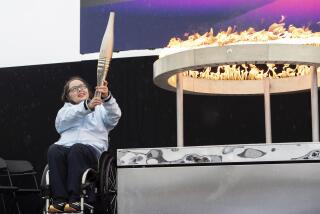Olympic Torch Heats Up Tiny Town’s Spirit
- Share via
JACUMBA, Calif. — Jochen Tartak didn’t sweat it Monday when he carried the Olympic flame across the desert and into California. After all, he had a police escort as he hit 70 mph at the state line.
Tim Hoffman didn’t sweat it, either, when he carried the Olympic torch down this mountain hamlet’s main street at about 5 mph. He had two dozen kids ready to catch him if he stumbled.
Hoffman, 47, a school janitor from El Cajon, was California’s first real torchbearer as promoters of the Winter Games brought the Olympic torch relay to the state for a weeklong run.
“Run” may be a bit of an exaggeration. Torch-carrying runners will cover only about 20% of the 1,167 miles through California that the Olympic flame will travel by next Monday. Fire-breathing machines such as Tartak’s pickup truck will handle the rest.
By plane, boat, dog sled, snowmobile and truck, the flame lighted Nov. 19 in Olympia, Greece, is meandering across the country on its way to Salt Lake City. By the time it gets there Feb. 8, it will have traveled more than 13,500 miles, carried by 11,500 torchbearers. Make that 11,550, counting Tartak and his fire-handling co-workers.
If relays of runners were to carry the torch every step of the way, it would take 375 days to make the Winter Games’ trek instead of the 65 that organizers have allocated. And that’s if the torches were passed nonstop, from sunrise to sunset.
The flame will flare from a propane-fueled burner on the back of a pickup truck for part of today’s trip from San Diego to Los Angeles--primarily between Laguna Beach and Newport Beach and between Costa Mesa and Los Angeles’ Olvera Street, relay officials said. A truck will also be used to carry the flame on a leg of the trip this evening to Universal City.
Monday’s relay started with the flame delivered on a train’s flatcar to 10 runners who carried it two miles through Yuma, Ariz. From there was the high-speed dash across the desert and into California--where driver Tartak, a 30-year-old North Carolinian, barely slowed down for the state agricultural inspection station.
But things came to a stop in Jacumba, a town of 400 people, three churches and half a dozen businesses. Relay organizers let five runners carry torches down Old Highway 80, the main drag.
The whole town lined the street to cheer Hoffman, and then Alan Lerchbacker, 49, of Pasadena; Carol Regaldo, 16, of Jacumba; David Riggs, 28, of San Diego; and Crystal Fernando, 39, of San Marcos.
Olympic relay organizers have a soft spot in their hearts for this San Diego County town, which is nestled against the U.S.-Mexico border. In 1996, the Summer Games’ relay passed through Jacumba. When one of that year’s relay runners failed to show up, student Fred Zavala, 13, stepped forward to take his place.
“It was such a moment that year. All 50 kids in the Jacumba School were out cheering with paper torches they’d made. Here we were in this little jewel in the desert. There are several of us here this year who remember this place from last time,” relay worker Cheryl Cagle said.
On Monday, the schoolchildren serenaded the runners and relay workers with “God Bless America” and served them Krispy Kreme doughnuts they had fetched from 60 miles away.
Teenage runner Carol--who was nominated to be a torchbearer by the children because of her volunteer work as an after-school tutor to younger pupils--was given her torch to keep by officials who ordinarily offer them for sale at $335 apiece. Regaldo promptly donated it to the school.
Pupils from Hoffman’s Dehesa School high-fived their janitor. They had written letters of recommendation that helped him win a spot in the relay. “If he had dropped the torch I’d have picked it up for him,” said fourth-grader Scott Ybarrondo.
“This is the biggest thing that has ever happened to us,” said Kimberly Jump, 45, a bartender who lives in a trailer at the edge of town. “People don’t usually find us. We’re off the beaten track.”
Torch relay spokesman Ahmad Corbitt said the relay passes through towns smaller than Jacumba. But it’s the smallest place flame carriers are actually running through.
Lots of bigger places can’t hold a torch to big-hearted Jacumba.
More to Read
Go beyond the scoreboard
Get the latest on L.A.'s teams in the daily Sports Report newsletter.
You may occasionally receive promotional content from the Los Angeles Times.







